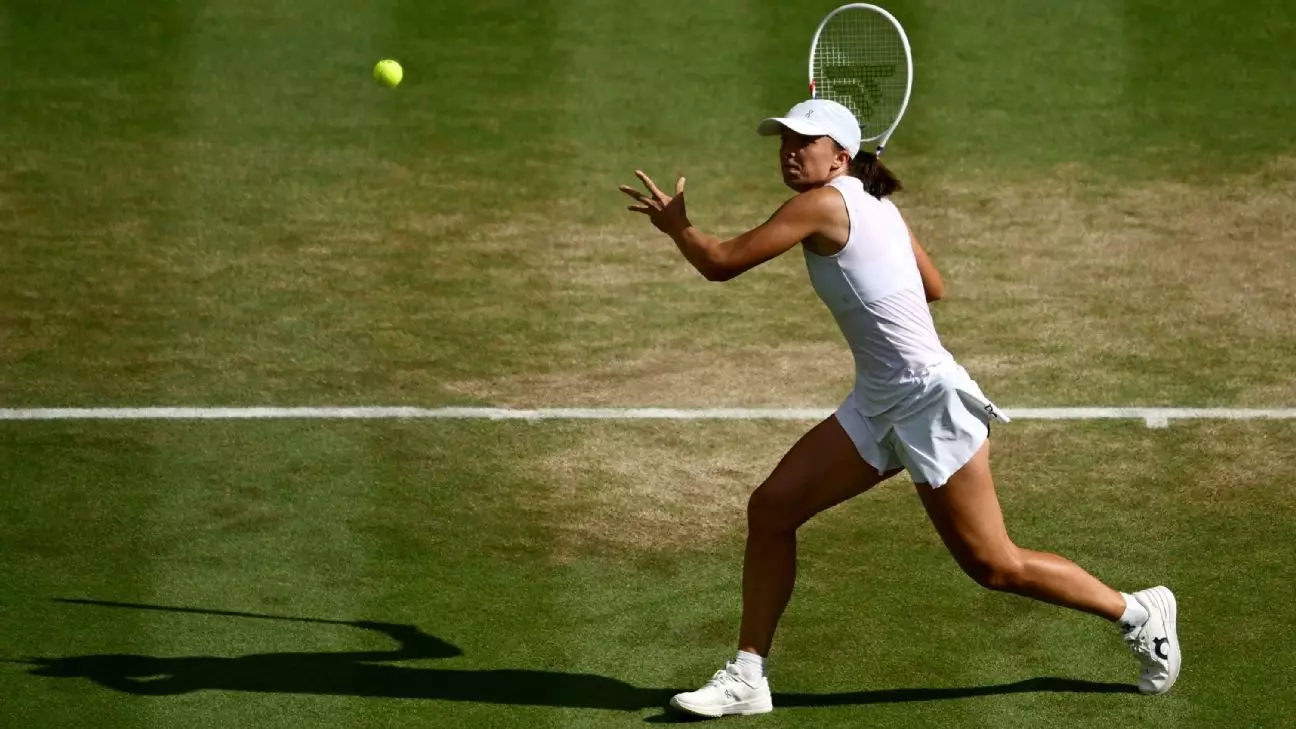Iga Swiatek’s recent Wimbledon triumph, a stunning 6-0, 6-0 victory, seemed to symbolize her unquestionable mastery of the sport. Yet, beneath the surface of this seemingly perfect victory lies a more complex reality—a narrative often constructed to elevate certain athletes to mythic status. Her clean sweep, while undeniably impressive, prompts us to question whether such performances truly reflect comprehensive excellence or if they sometimes mask vulnerabilities and inconsistencies.
Swiatek’s ability to dominate Amanda Anisimova in just 57 minutes invites admiration but also skepticism. Given the historical rarity of such two-set shutouts in women’s major finals, it’s tempting to romanticize her achievement. However, this specific result may overlook the context: Anisimova’s mental hurdles at Wimbledon and her inconsistent form leading up to the final suggest that Swiatek won more by her opponent’s struggles than by showcasing an invincible game. The narrative of her unstoppable ascent risks glossing over moments where her true resilience and versatility are tested, especially on unfamiliar surfaces like grass.
The Obsession with Perfection and Its Consequences
The media coverage surrounding Swiatek’s victory emphasizes her record-breaking milestones—most notably her sixth major, her 100th Grand Slam win, and her rapid path to 100 match victories—yet these accolades can distort a more nuanced understanding of her career. This relentless focus on statistics and historic achievements often shifts attention away from deeper critiques: Are her victories driven by genuine growth, or are they propelled by a system that demands relentless performance from young athletes? Particularly troubling is the shadow of her doping ban—an incident that highlights the vulnerabilities and ethical dilemmas hidden within high-stakes professional sports.
Swiatek’s doping controversy, which resulted from inadvertent exposure to contaminated medication, raises essential questions about the ethics of performance enhancement, medical oversight, and athlete vulnerability. In an environment where pressure to perform is immense, the assumption of innocence can sometimes obfuscate the broader issues in sports governance and athlete health. Her case serves as a reminder that behind the record-breaking facade are human beings susceptible to external influences, and that the pursuit of perfection often comes with hidden costs.
The Myth of the Self-Made Athlete
While Swiatek’s rise to prominence is often portrayed as a story of innate talent and determination, it’s critical to interrogate the structures that support her success. Her early junior achievements, her comeback from a lengthy drought without titles, and her ability to adapt to different surfaces reveal resilience—but also reflect systemic investments in training, coaching, and facilities that are not available equally across the sport. Her journey underscores how access and institutional support can shape narratives of greatness, often leaving out the socioeconomic and cultural factors influencing athlete development.
Furthermore, the focus on her surface versatility—being one of only a handful of women to win majors on three different courts—sometimes oversimplifies the nuanced skill sets required for success across varied terrains. It risks romanticizing a seemingly effortless adaptability that, in reality, involves countless hours of training and strategic adaptation. If anything, her success demonstrates the importance of a supportive system that fosters growth but also highlights that individual achievement is rarely the result of pure talent alone.
The Overhyped Nature of Youth and Emotional Resilience
The journey of Amanda Anisimova to her first Grand Slam final, marked by her young age and turbulent personal history, offers a stark contrast to Swiatek’s polished narrative of dominance. Anisimova’s story—marked by early success, mental health breaks, and her perseverance—challenges the conventional glorification of youth as an indicator of readiness or potential. Her resilience underscores that mental fortitude, often lauded as innate, can be cultivated through struggles and setbacks that the sport itself sometimes glosses over.
In championing athletes like Swiatek, the narrative often shifts focus away from the importance of mental health, well-being, and the realities of sustaining high-level performance in a demanding environment. Both her and Anisimova’s stories reveal that true strength in sports is not merely about physical prowess or statistics, but about confronting internal and external challenges—a responsibility that the sport’s culture needs to acknowledge more openly. The tendency to prioritize medals and records over athlete welfare distorts the values that should underpin athletic achievement.
This reflection drives home the point that, as fans and commentators, we should resist the allure of simplified narratives that elevate athletes to near-perfection. True admiration lies in recognizing the complexity of their journeys—full of setbacks, vulnerabilities, and ethical dilemmas—that shape what we often celebrate as “greatness.”


Leave a Reply